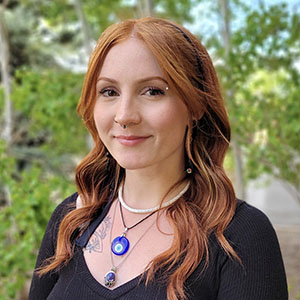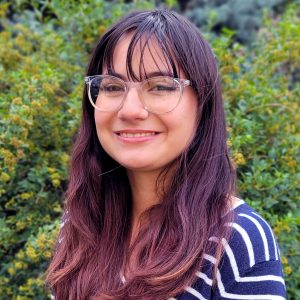COMPUTER SCIENCE FACULTY AND STAFF DIRECTORY
My research interests are in artificial intelligence, machine learning, neural networks, reinforcement learning, and brain-computer interfaces. I hold joint appointments in the Molecular, Cellular and Integrated Neuroscience Program, the School of Biomedical Engineering, the Graduate Degree Program in Ecology, and the Systems Engineering Program.
My research concentrates on studying algorithms, technologies, perceptual mechanisms, and human visual systems to understand better the spatial perception of real and simulated virtual objects in real, augmented, and virtual environments.
My research interests broadly cover machine learning and artificial intelligence applications. I work with several data modalities including computer vision, audio/text, and human-centric data such as fMRI, eye-gaze, and physiology. I have researched applications for student learners, teachers in classrooms, generalized AI, athlete injury prevention, and sentiment analysis.
I am a graduate of the UWC of Hong Kong and NYU. In 2014 I was honored by the National Science Foundation at the White House as one of the “100 SuperStar Computer Science instructors” in the United States. I spent 2017 on a fellowship studying high performing low-income schools across the US.
My research interests include approximate counting and sampling, probabilistic combinatorics, and extremal graph theory. I investigate high-dimensional combinatorial spaces and whether they can be efficiently enumerated or explored. My work frequently combines ideas from computer science, mathematics, and physics.
My research is in applied AI and human aspects of software engineering, specifically in supporting individuals and communities to solve project tasks by matching their skills and expertise, contributing to workforce onboarding and retention.
My research is in computer vision and machine learning, and specifically, developing techniques for visually recognizing people, their gestures, and their actions, and for applying these recognition techniques to complex systems of interacting people and machines. I also hold an appointment in the Molecular, Cellular and Integrated Neuroscience (MCIN) program.
My research interests are in the areas of modeling and testing software in the object-oriented, aspect-oriented, and component-based paradigms. I serve on the editorial boards of prominent technical publications, co-chair major conferences in the field, and am a member of the ACM and Senior Member of the IEEE.
Communication Networks and Protocols, Design Testing of Digital Systems
Computational and Applied Mathematics, Optimization and Mathematical Modeling
My research lies at the intersection of Computational Linguistics/Natural Language Processing, Artificial Intelligence, Machine Learning, and Embodied Cognition. I use simulation and multimodal methods to research human language understanding, communication, and reasoning in a computational context.
My research interests cover several key areas in reliable and secure computing. I work on topics that include vulnerability discovery, security risks and economics, software reliability, test effectiveness, impact of testing on reliability, fault modeling, and fault tolerance.
Formal Methods, Machine Learning, Trustworthy AI, Assured Autonomy, Program Analysis and Verification
I teach undergraduate courses in the Department of Computer Science and joined the faculty after 37 years in industry, primarily at HP in software R&D. My experience includes projects in languages, software engineering, networking, network management, user experience, and databases. I received my M.S. in computer science from CSU in 2013.
Programming Languages, Program Synthesis/Verification, High-Performance Computing, Software-Defined Networking
My research interests are in learning analytics, technology enhanced teaching and learning, computer science education, and distance learning. I am particularly interested in developing innovative applications and methods that improve learning and teaching.
My main research area focuses on improving user interaction by eliciting (hand and full-body) gesture sets by user elicitation, developing interactive gesture-recognition algorithms, multimodal user interaction for virtual and augmented reality, and how to increase interest in computer science for non-CS, entry-level college students.
My research interests are in the area of Big Data for the sciences, with an emphasis on issues related to predictive analytics, storage, retrievals, and metadata management. The research crosscuts data science and data engineering especially in the context of voluminous, high-velocity data. Software produced by my group has been deployed in agricultural sciences, environmental monitoring, epidemiology, and meteorology.
My research interests are broadly in large-scale systems, big data, cyberinfrastructure, and GeoAI with a focus on using machine/deep learning, probabilistic, and statistical techniques to address scaling, autonomy, and tractability issues. These efforts target processing, routing, storing, and mining data streams generated by networked sensors, observational equipment, and programs with an emphasis on spatial data. I direct the Center for eXascale Spatial Data Analytics and Computing (XSD) (https://spatial.colostate.edu/) at CSU.
My research focuses on data networking. Any problem that involves moving bits, bytes, packets, chunks, files, or another abstraction between two machines is of interest to me. Much of my recent work has been in wireless networks. As department chair, I am working to improve the diversity of our student body and to expand our industry partnerships.
My research broadly focuses on software algorithms, hardware architectures, and hardware-software co-design for energy-efficient, fault-resilient, real-time, and secure computing. These efforts target multiscale computing platforms, including embedded and Internet of Things (IoT) systems, cyber-physical systems, mobile devices, and datacenters.
Optimizing Compilers, Parallel and Distributed Systems, High Performance Computing
Cyber-physical Systems, Formal Methods, Hybrid Systems, Verification and Control
Parallel Computing, Computer Architecture, Application Specific VLSI Processors, Embedded Systems
Database Systems, Transaction Processing and Workflow Systems, Computer and Network Security, Security Protocols, E-commerce Protocols
Database Systems, Formal Methods, Computer Security, E-commerce Protocols
My general research interests include Artificial Intelligence (AI), Automated Planning, Reinforcement Learning (RL), Explainable/Human-Aware AI, and Neuro-Symbolic AI. My current focus is on developing AI systems that can make robust sequential decisions and effectively work and cooperate with people from all walks of life. In particular, I have developed planning and RL algorithms that can account for user expectations during decision-making and explanation generation algorithms for plans and policies generated by state-of-the-art AI techniques.
Bianca's interdisciplinary research aims to understand how the members of software engineering teams can flourish and better interact to produce software, leveraging Developer Experience and Productivity, Technostress, and Diversity, Equity, Inclusion & Belonging. Bianca has published in prestigious venues like ICSE, CSCW, TSE, TOSEM, and IEEE Software and has received numerous awards, including the 2024 ACM SIGSOFT Outstanding Doctoral Dissertation, ICSE Technical Track 2023 (Distinguished Paper Award), ICSE SEIS 2022 (Best Paper Award), CSCW 2020 (Honored Mention Award). She has over 20 years of industry experience, bridging the gap between academia and industry.
EMERITI FACULTY AND STAFF
Computer Vision, Model Matching, Sensor Fusion, Visual Feature Extraction, Local Search Optimization
Software Engineering, Software Metrics and Measurement, Object-oriented Software, Software Design and Testing
Distributed Evaluation of Functional Programs
My research is on efficient algorithms for combinatorial problems. I am especially interested in recursive decompositions of arbitrary graphs and digraphs, algorithms for classes of graphs that are subclasses of the class of perfect graphs, and classes of graphs that have geometric representations.
Distributed and Heterogeneous Computing, Parallel Processing, Architectures and Algorithms, Networks
STUDENT STAFF ASSISTANTS

LEIGHA RICHARDS-ORCUTT / Student Staff Assistant
Email: compsci_receptionist@Mail.colostate.edu Phone: (970) 491-6512 Office: Computer Science Building 279

EDITH VALENZUELA / Student Staff Assistant
Email: compsci_receptionist@Mail.colostate.edu Phone: (970) 491-6512 Office: Computer Science Building 279
COLLEAGUES IN MEMORIAM
WIM BÖHM
Professor
In Memoriam

ROBERT FRANCE
Professor Emeritus
In Memoriam
ADELE HOWE
Professor Emeritus
In Memoriam

ROD OLDEHOEFT
Professor and Department
Chair Emeritus

BERNARD MARSCHNER
Professor and Department Chair





























































